40 food labels and their meanings
Food labels - Better Health Channel Reduced fat or salt - should be at least a 25% reduction from the original product. Low fat - must contain less than 3% fat for solid foods (1.5% for liquid foods). Fat free - must be less than 0.15% fat. Percentage of fat - remember 80% fat free is the same as 20% fat, which is a large amount. Home - Rock River Valley Pantry FOOD FOR THOUGHT. As Winston Churchill said, “We make a living by what we get, but we make a life by what we give.” Generous Donors and generous volunteers make it all possible, as we all get by with a little help from our friends. Thanks for being a friend!
Understanding Dates on Food Labels - Academy of Nutrition and Dietetics These are found primarily on perishable foods such as meat and dairy products. "Closed Dating" is a series of production numbers used by the manufacturer to indicate when a product was made. They primarily appear on shelf stable products such as cans and boxes of food. Except for infant formulas, product dates are not expiration dates.
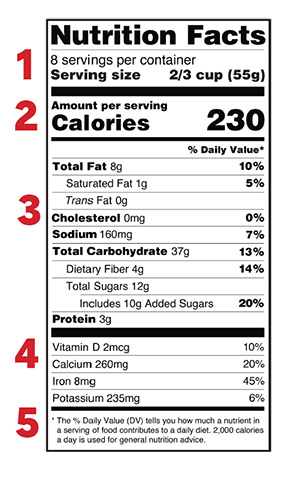
Food labels and their meanings
How to Read a Food Label - FoodAllergy.org These are milk, egg, peanut, tree nuts, soy, wheat, fish and crustacean shellfish. Note that molluscan shellfish—such as oysters, clams, mussels or scallops—are not required to be labeled as a major allergen. What Should I Look For? FALCPA-regulated allergens can be called out in one of three ways: How To Read Food and Beverage Labels - National Institute on Aging At the top of the Nutrition Facts label, you will find the total number of servings in the container and the food or beverage's serving size. The serving size on the label is based on the amount of food that people may typically eat at one time and is not a recommendation of how much to eat. Read more about serving and portion sizes. Food Labels | CDC - Centers for Disease Control and Prevention If you eat the whole thing, you are eating 8 times the amount of calories, carbs, fat, etc., shown on the label. Total Carbohydrate shows you types of carbs in the food, including sugar and fiber. Choose foods with more fiber, vitamins, and minerals. Choose foods with lower calories, saturated fat, sodium, and added sugars. Avoid trans fat.
Food labels and their meanings. 16 Food Labels and What They Mean - Hobby Farms Below are a selection of common food labels and what they mean. Use them to help inform your buying and production decisions. 1. All Natural, USDA recognized claim for products that are minimally processed and contain no artificial ingredients, including but not limited to artificial colors or flavors. Food Labels (for Teens) - Nemours KidsHealth Food labels provide more than just nutrition facts. They also tell you what's in a packaged food (i.e., the ingredients). People with food allergies need to check ingredient lists to avoid foods that can cause an allergic reaction. Some food labels also state which country the food came from, whether the food is organic, and certain health claims. How to Read Food Labels: Your Complete Consumer Guide Details included on food labels are the nutritional composition of a food, as well as ingredients and their relative amounts. When relevant, they may also indicate important details about the food's quality, origin, processing, and method of preservation. With this information, the theory goes, you can make intentional decisions about what to buy. Everything about the color Electric Blue - Canva's Design Wiki Today, any artificial blue light might be described as “electric blue”—for instance, the color of neon signs. Even luminol, the chemical used to detect blood in crime scene investigations, glows a high-voltage shade of blue.In nature, both the electric blue crayfish and electric blue gecko are named for their bright blue appearance.
PDF Food Labeling Guide - Food and Drug Administration Office of Nutrition, Labeling, and Dietary Supplements HFS-800 Center for Food Safety and Applied Nutrition Food and Drug Administration 5100 Paint Branch Parkway College Park, MD 20740 (Tel)... Food Labeling & Nutrition | FDA Food labeling is required for most prepared foods, such as breads, cereals, canned and frozen foods, snacks, desserts, drinks, etc. Nutrition labeling for raw produce (fruits and vegetables) and... Understanding Food Nutrition Labels | American Heart Association When the Nutrition Facts label says a food contains "0 g" of trans fat, but includes "partially hydrogenated oil" in the ingredient list, it means the food contains some trans fat, but less than 0.5 grams per serving. So, if you eat more than one serving, you could end up eating too much trans fat. 17 Food Certification Labels Decoded - Treehugger Food Alliance Certified. What it means: A third-party verified seal: No hormones, non-therapeutic antibiotics or genetically modified crops or livestock are used and pesticide use must be reduced ...
Understanding Ingredients on Food Labels - American Heart Association Understanding Ingredients on Food Labels. Food labels are an important source of information about calories and the nutritional value of the foods you eat, a crucial tool in building a heart-healthy diet. The Nutrition Facts information is always displayed in the same orderly fashion and helps you understand how much of certain nutrients that ... 8 Confusing Food Labels and Their Meanings | Eat This Not That Both natural and artificial flavors are made in a lab, but artificial flavoring is created from synthetic rather than natural chemicals. One benefit of choosing natural over artificial is that natural flavors often exist in more nutrient-dense foods. 4, USDA Certified Organic, Organic is arguably the most tightly regulated label. Understanding Kosher Symbols: A Quick Guide for Dairy-Free Consumers So a kosher dairy certified product can be dairy-free by ingredients. An " OU-DE " symbol stands for "dairy equipment," and means the product does not contain any ingredients with milk or milk derivatives, but it was made on dairy equipment. An " OU-M " symbol or an " OU-Glatt " symbol indicates that the product is Kosher meat. From the Label to the Table! - Kids Environment Kids Health - National ... Food Labels Tell the Story! What is in food? Food provides your body with all of the materials it needs to grow, and to be healthy and active. These are some of the building blocks in food. CARBOHYDRATES are the body's main source of fuel. Starchy foods like breads, spaghetti, rice, potatoes, corn and cereals are made up mostly of carbohydrates.
How to Read Food Labels Without Being Tricked - Healthline Nutrition labels state how many calories and nutrients are in a standard amount of the product — often a suggested single serving. However, these serving sizes are frequently much smaller than what...
Food Marketing and Labeling - Johns Hopkins University Food labeling. People rely on food labels to tell them what a product contains, its nutritional value, and how it was produced. For example, shoppers may look for products labeled "organic," "no trans fats," or "antibiotic-free," or may want to know about animal welfare standards or fair labor practices.
How ancient Roman souvenirs made memories and meanings - Aeon Jul 01, 2022 · Baiae, for its part, is encapsulated by its ostriaria (artificial beds for raising oysters, a luxury food) and domed bathhouses. Labels accompany the images, and some flasks have an inscription added at their shoulder to personalise the souvenir.
Food labels - NHS Most pre-packed foods have a nutrition label on the back or side of the packaging. These labels include information on energy in kilojoules (kJ) and kilocalories (kcal), usually referred to as calories. They also include information on fat, saturates (saturated fat), carbohydrate, sugars, protein and salt.
Deeper, Hidden Meanings and Themes in "Alice's ... - Owlcation May 05, 2009 · The obvious one, acid. It turns out the author of this book was on a lot of drugs while writing it, so that could really be what it is about. I have also heard that it is about the author's childhood. He apparently had an eating problem when he was young, (not an eating disorder) and basically everything in this book revolves around food.
Understanding Food Terms - American Cancer Society Make food labels work for you. Use them when you shop or snack, as you plan your meals, and as you cook each day. The label helps you figure out the amounts of nutrients you're getting and compare one product to another. Reading and understanding food labels is a good step toward healthy eating.
How to Understand and Use the Nutrition Facts Label | FDA - U.S. Food ... You can use the label to support your personal dietary needs - look for foods that contain more of the nutrients you want to get more of and less of the nutrients you may want to limit. Nutrients...
Food Labels | Nutrition.gov Food Labels, Food labels can help you make healthy choices when buying food in grocery stores or restaurants. Labeling Organic Products, USDA, Agricultural Marketing Service, National Organic Program, Learn about organic foods, requirements, and how they are labeled. Calories on the Menu, HHS, Food and Drug Administration,
What Food Label Symbols Mean | Custom Label Blog Food label symbols cover a gamut of issues from growing practices and environmental sustainability, to labor conditions and animal treatment. Many of these certifications are recent creations due to consumer concerns about what they're putting into their body and how it affects the world around them.
How to understand food labels | Eat For Health All ingredients in a food product must be listed on the label in order (Food Labels - What do they mean? Food Standards Australia and New Zealand, from largest to smallest by weight. You can use this to spot foods that might be high in saturated fat, added salt or added sugars because these ingredients are listed in the top three.
Food Labels 101: Understanding the Nutrition Facts Label A sodium level of 140 mg or less on the nutrition facts label is considered low sodium. This is an essential number to look for when reading the label. Total Carbohydrates - Fiber and Sugar, Foods high in fiber can be beneficial to a healthy diet, as fiber helps manage blood sugar levels and can lower cholesterol.
Food Labelling | FAO | Food and Agriculture Organization of the United ... The internationally accepted definition of a food label is any tag, brand, mark, pictorial or other descriptive matter, written, printed, stencilled, marked, embossed or impressed on, or attached to, a container of food or food product.
Food Label Terms and What They Really Mean - dummies Some containers look as though they should contain one serving, because that's probably how most people consume them. However, consider that, A 16-ounce container of iced tea is 2 servings. A 6 1/2- to 7-ounce can of tuna is 2 1/2 servings. A 4-, 6-, or 8-ounce container of yogurt is considered 1 serving. A 20-ounce bottle of soda is 2 servings.
Food Labels Explained - Farm Aid Organic labels can be found on produce, dairy, meat, processed foods, condiments and beverages. Food products labeled "organic" must contain at least 95% organic ingredients with no synthetic growth hormones, antibiotics, pesticides, biotechnology, synthetic ingredients or irradiation used in production or processing.
Food Labels | CDC - Centers for Disease Control and Prevention If you eat the whole thing, you are eating 8 times the amount of calories, carbs, fat, etc., shown on the label. Total Carbohydrate shows you types of carbs in the food, including sugar and fiber. Choose foods with more fiber, vitamins, and minerals. Choose foods with lower calories, saturated fat, sodium, and added sugars. Avoid trans fat.
How To Read Food and Beverage Labels - National Institute on Aging At the top of the Nutrition Facts label, you will find the total number of servings in the container and the food or beverage's serving size. The serving size on the label is based on the amount of food that people may typically eat at one time and is not a recommendation of how much to eat. Read more about serving and portion sizes.
How to Read a Food Label - FoodAllergy.org These are milk, egg, peanut, tree nuts, soy, wheat, fish and crustacean shellfish. Note that molluscan shellfish—such as oysters, clams, mussels or scallops—are not required to be labeled as a major allergen. What Should I Look For? FALCPA-regulated allergens can be called out in one of three ways:


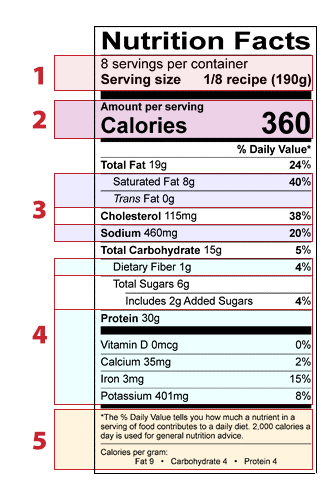
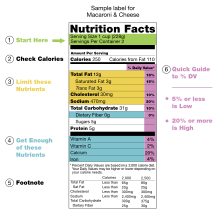


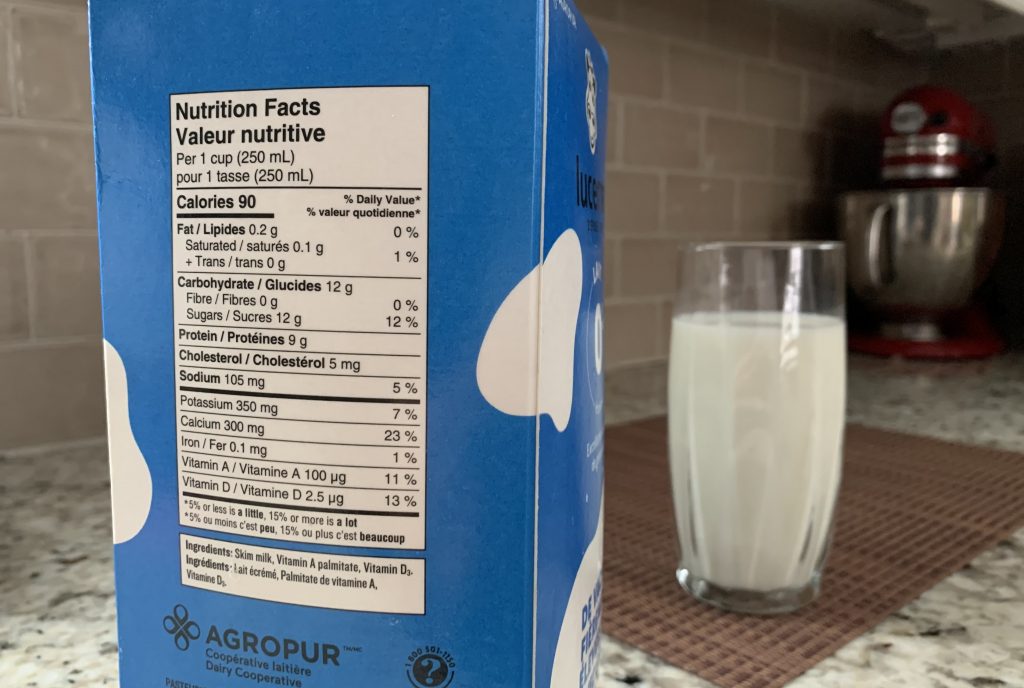

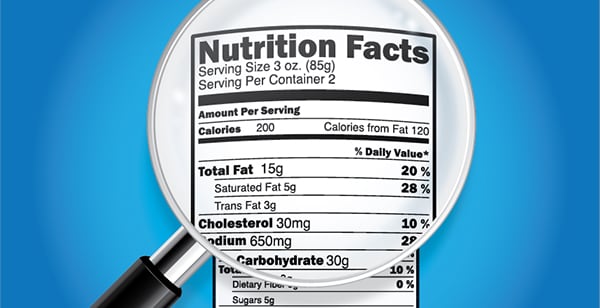
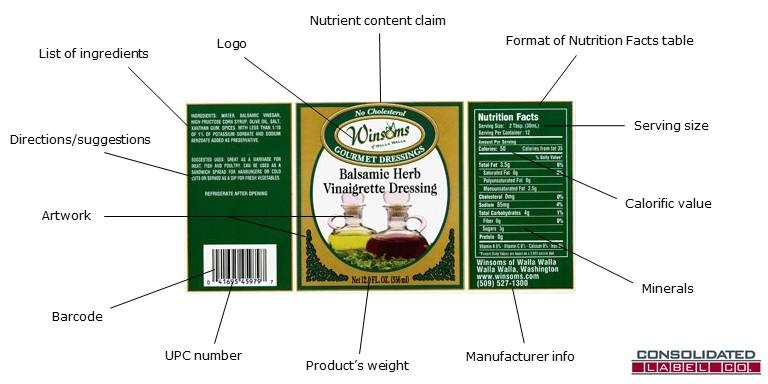

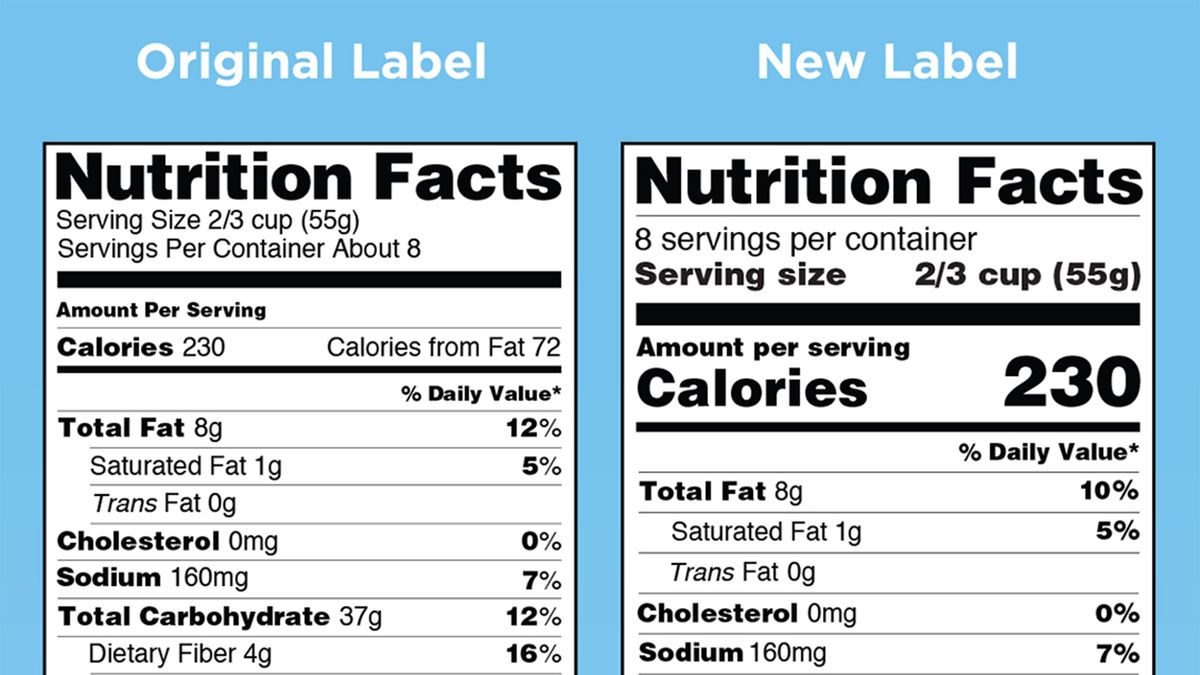




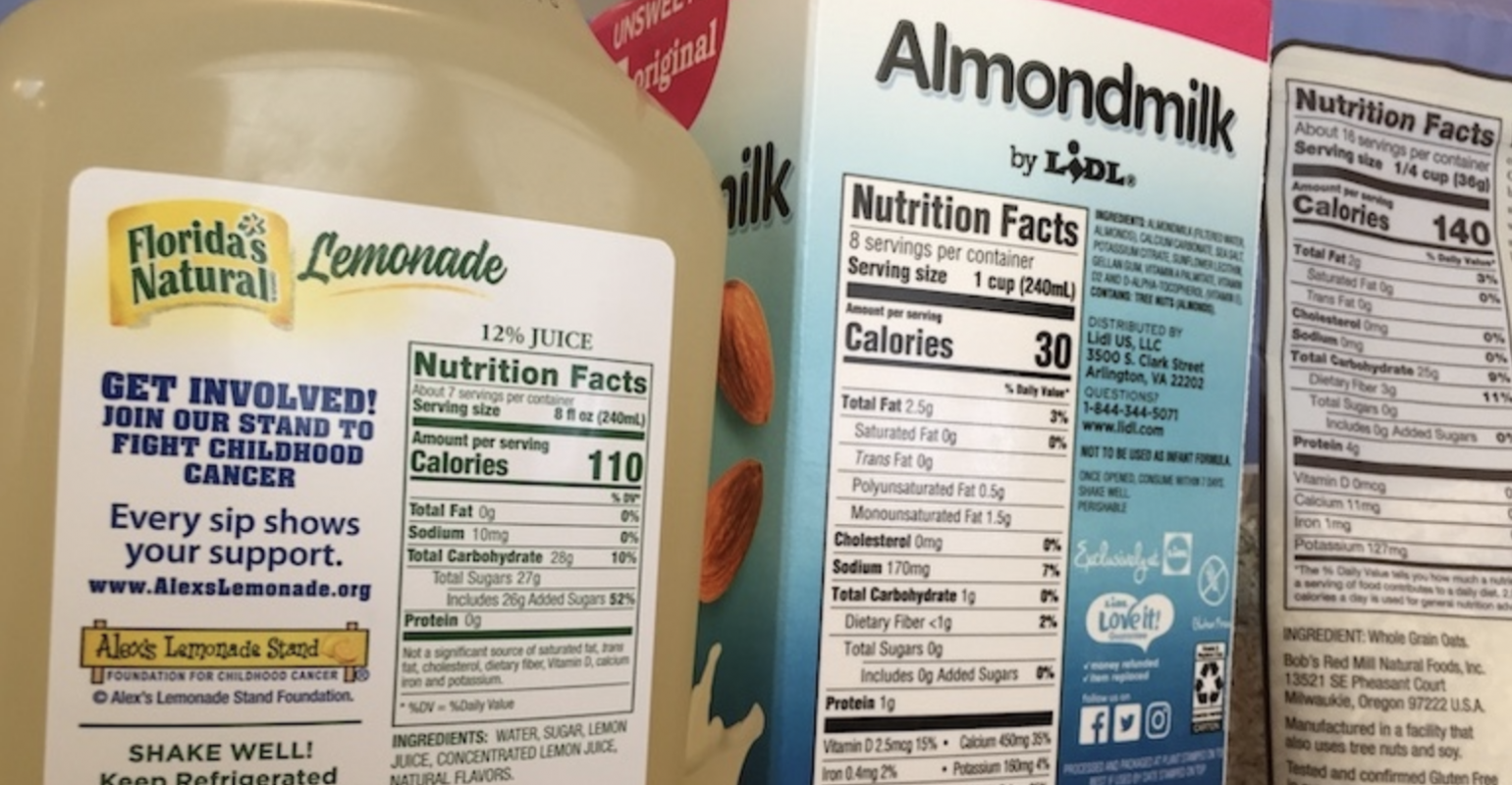
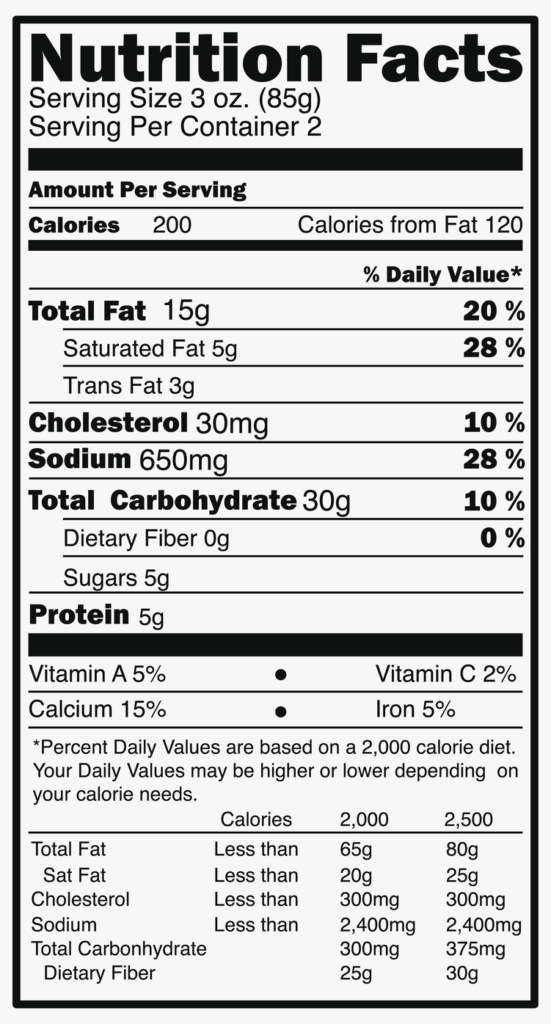

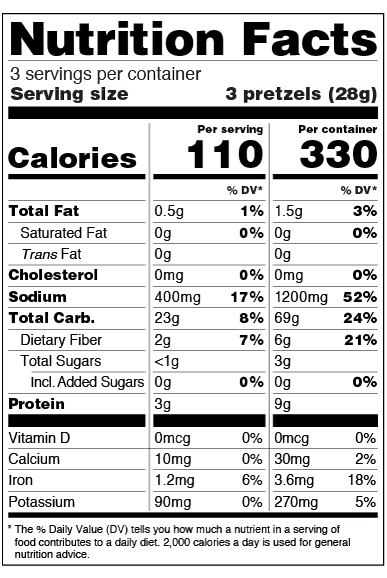


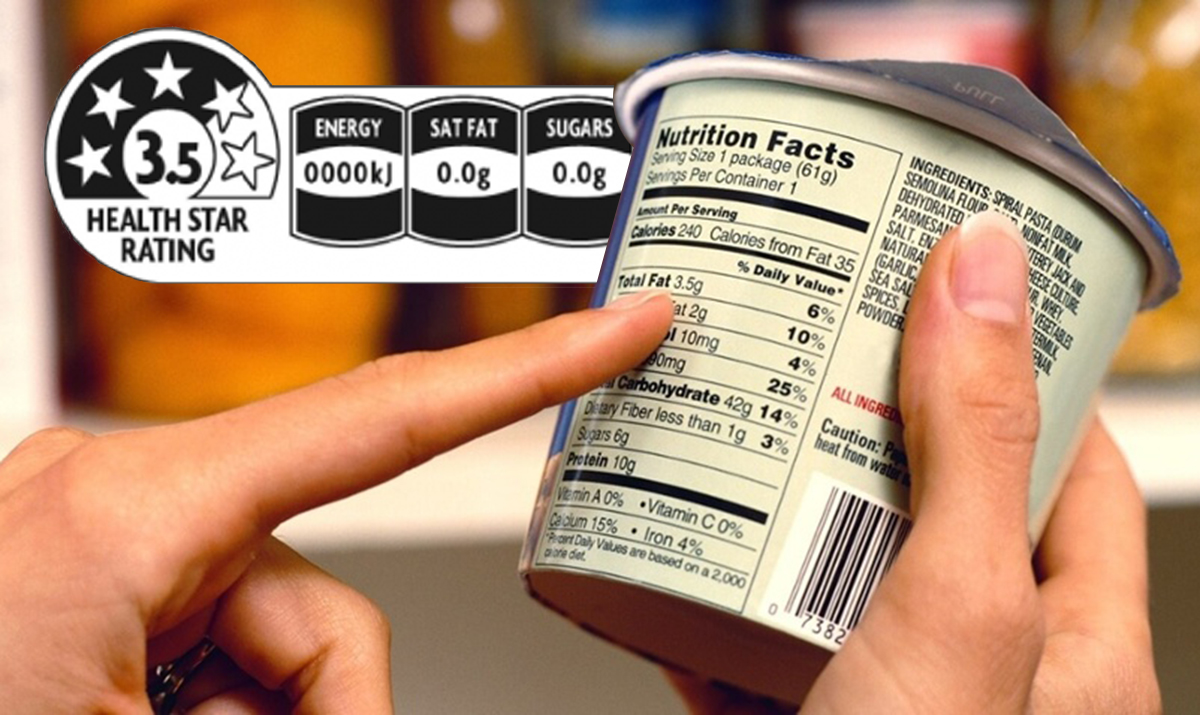
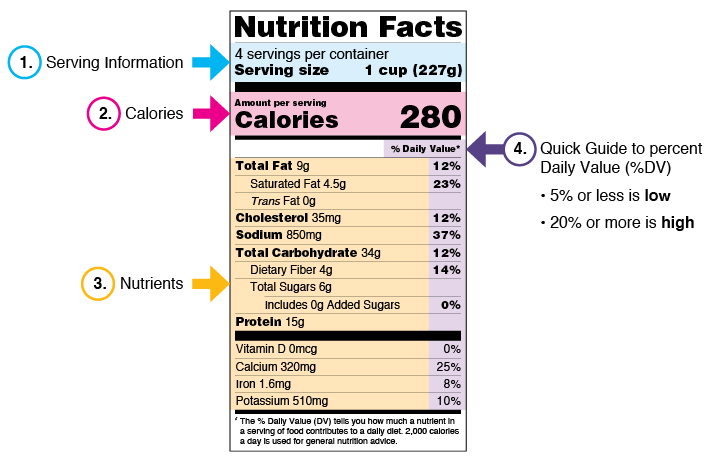


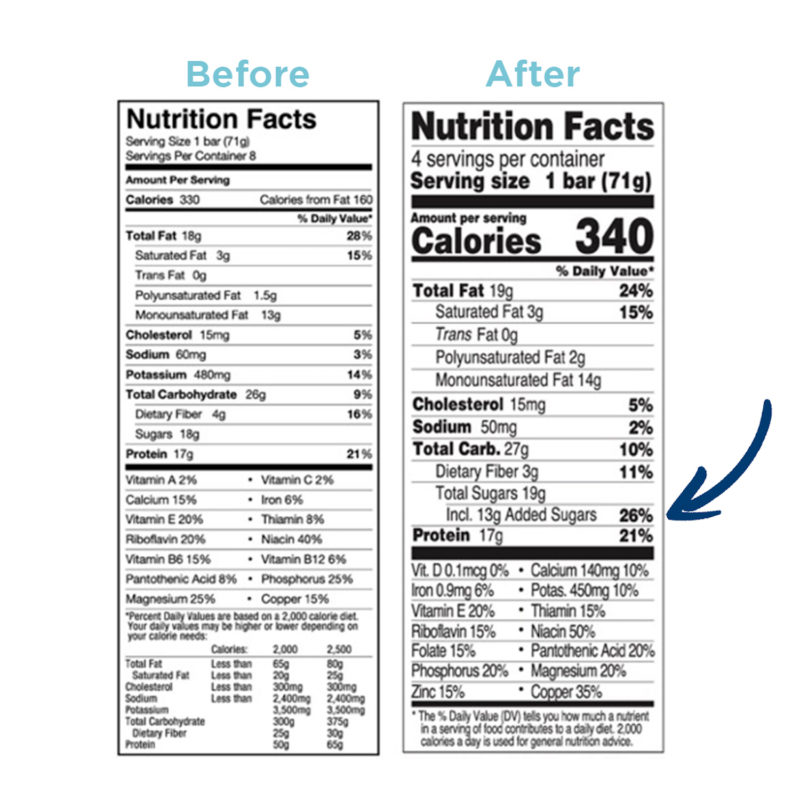
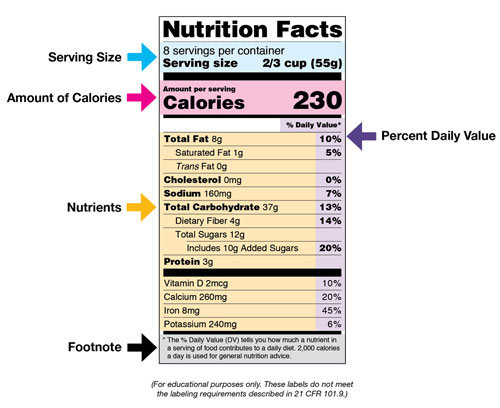
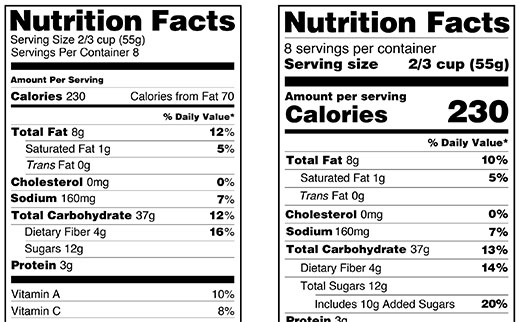

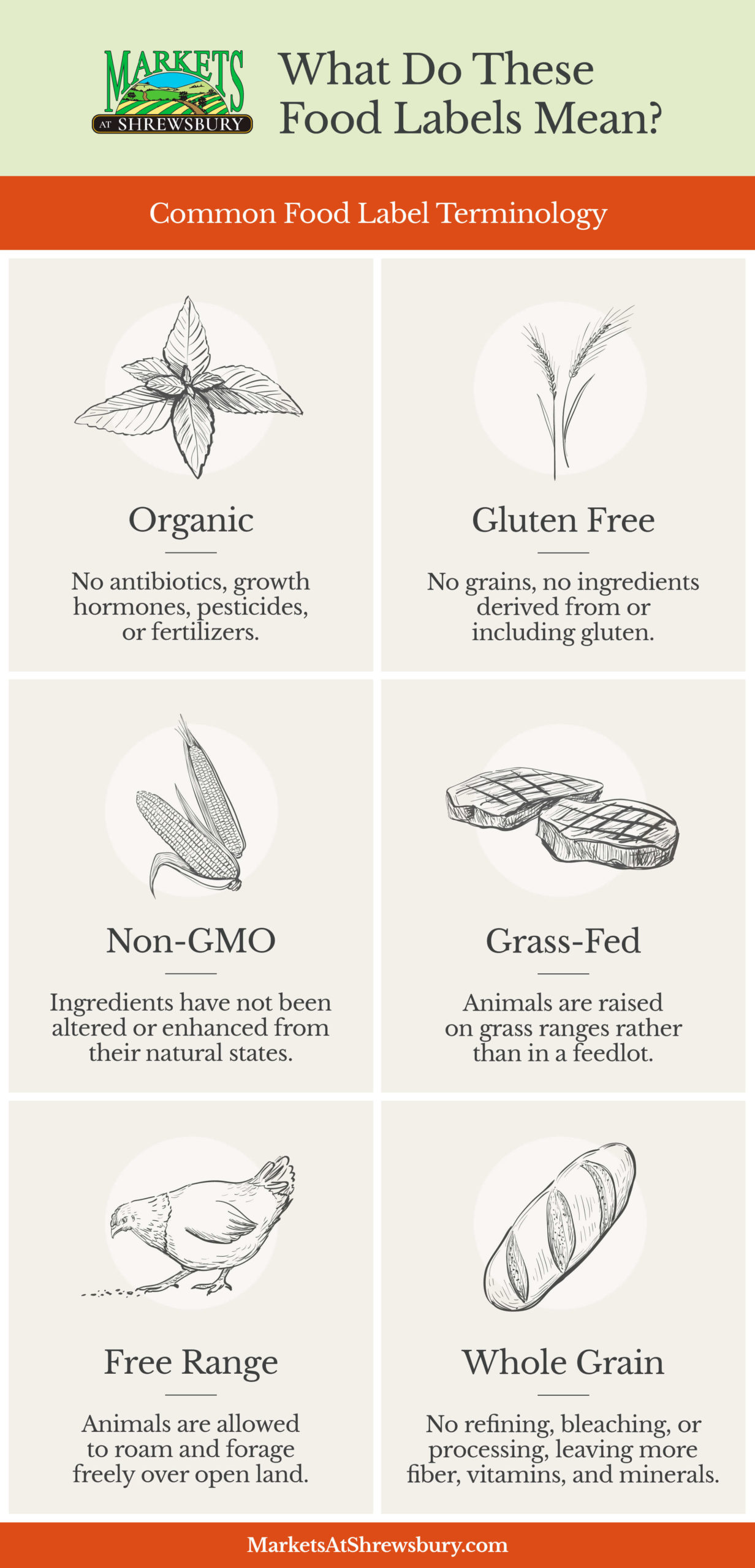


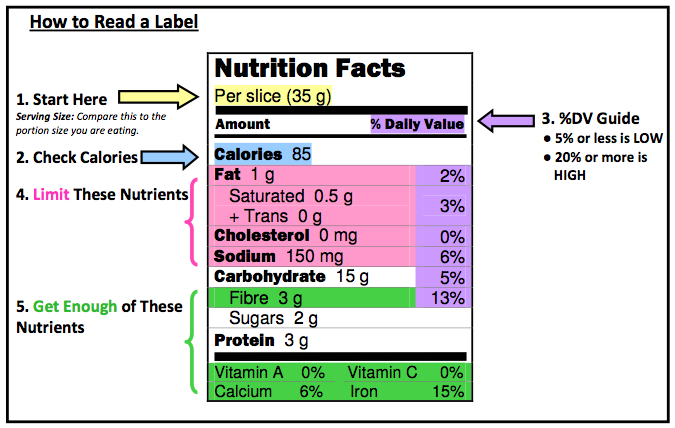

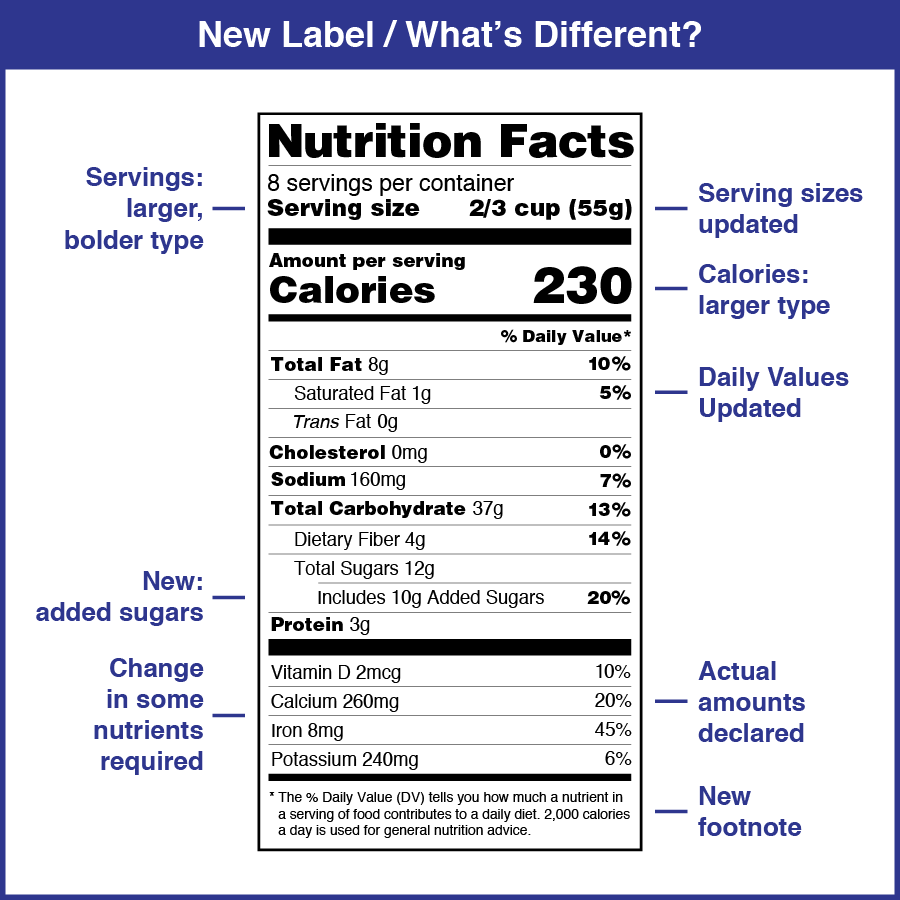
Post a Comment for "40 food labels and their meanings"